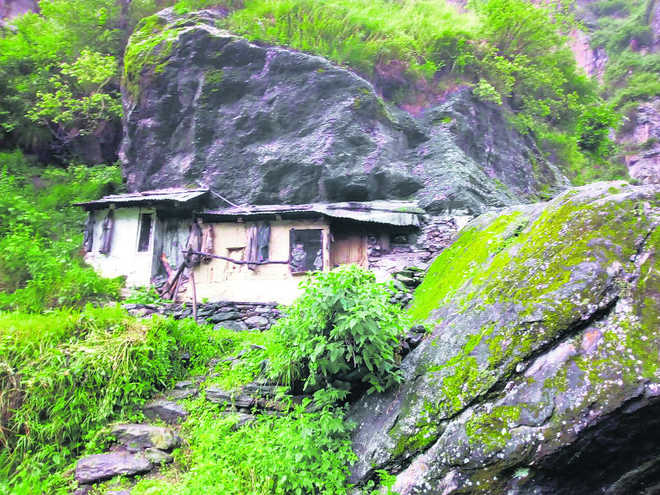
A long way, still: A handful of people in Shaakti use WhatsApp. Among them is the son of one of Sharma’s students. He clicked this photo of the cave for us
Sarika Sharma
Seventy years after independence, people from Shaakti village in the Great Himalayan National Park in Kullu finally saw their homes lighted last month. Men and women can now go on with their chores even after the sun goes down. The students can now study for longer. This has brought a smile to one man, Hari Dutt Sharma, who doesn’t live there any longer, but spent 13 years in a cave in the village. Only to teach students under the light of a lamp! In the lack of a school building, the former government school teacher taught and lived in that cave and introduced the students to the power of education.
Now known as the ‘cave man’, he was then, in 1988, a young teacher enthused by the idea of education changing lives. He hailed from Shensher, a village in the lap of the scenic Sainj valley. A narrow road and a bridge a few kilometers away was their connect with the world.
One day, he was told he has been posted at Shaakti, the last village high up in the hills, 25 km away. It fell in what is now the Unesco heritage tagged GHNP, but was not considered as exotic. However, outsiders did descend upon the village for smuggling of medicinal herbs and crystals. “It seemed like a place where god had created man, but no civilisation had developed.”
Hari Dutt went off. He knew it was not going to be easy to convince village children to come to school. However, as suggested by the then Kullu MLA Sat Prakash Thakur, he bought them some sweets and somehow engaged them. The first class started with 13 boys and girls on November 13, 1988. Since the village hadn’t seen any school, the students of class I were in the age group of 7 to 15! “Some of them even had moustaches!” he laughs.
The school started, but there were too many distractions. The students sometimes missed classes to attend a fair, sometimes to work in the field or look for herbs. And sometimes didn’t turn up just like that. Hari Dutt had to go out and look for them and fetch them back to the class.
It soon snowed and the little room in a government building they had been allotted gave in under the weight of snow. Hari was told to run the class in the village temple, but he felt it was too crowded for the students to study. “I was then told about this cave in the nearby jungle that I could turn into a classroom. I cleaned it along with some students and began the studies once again.” Since he had no place to stay, he began living in that cave as well. But another challenge soon cropped up. As the school was in a snow-bound area, students had to take final exams in December, for which they were understandably not ready. He told the education department officials to give them some time. It was decided that the exams will now be held in March. They had four months and Hari Dutt put in all his energies to teach them so that could they clear their exams and get promoted to second grade. Some of those who hailed from the nearby Shugaad village, which would become out of bounds when it snowed, began staying with him. He would cook kheer for his students and himself. “When I ran out of sugar, I made salty kheer.” He would occasionally go to Sainj, 45 km from Kullu town, to get rations, salary and mail.
In the following years, the students came far more easily and his hard work began to bear fruit. One of the girls from the first batch topped the district in class V. The education department, promoting Saksharta Mission (National Literacy Mission), was soon able to give the slogan of K, Kh, Ga sabhi-ra sathi, Shaakti, Maror, Kukdi, Kaathi, implying that from Shaakti, Maror, and Kukdi to Kaathi, the alphabets are now everybody’s friends. Hari Dutt hosted several government officials and leaders in his cave, which he later plastered and divided into two rooms, a kitchen and a washroom. The building was built about four months before he was transferred to a school in Shensher.
He retired last year, unsung, uncelebrated. No state award, no national recognition, just because he decided to do this job and not promote himself. Take this up with him, and he says he is a “small man”. Is he bitter? No. He is happy that some homes in Shaakti now have electricity because of a solar project. The students can now study beyond sun down. Many more lives will now be lighted.



























